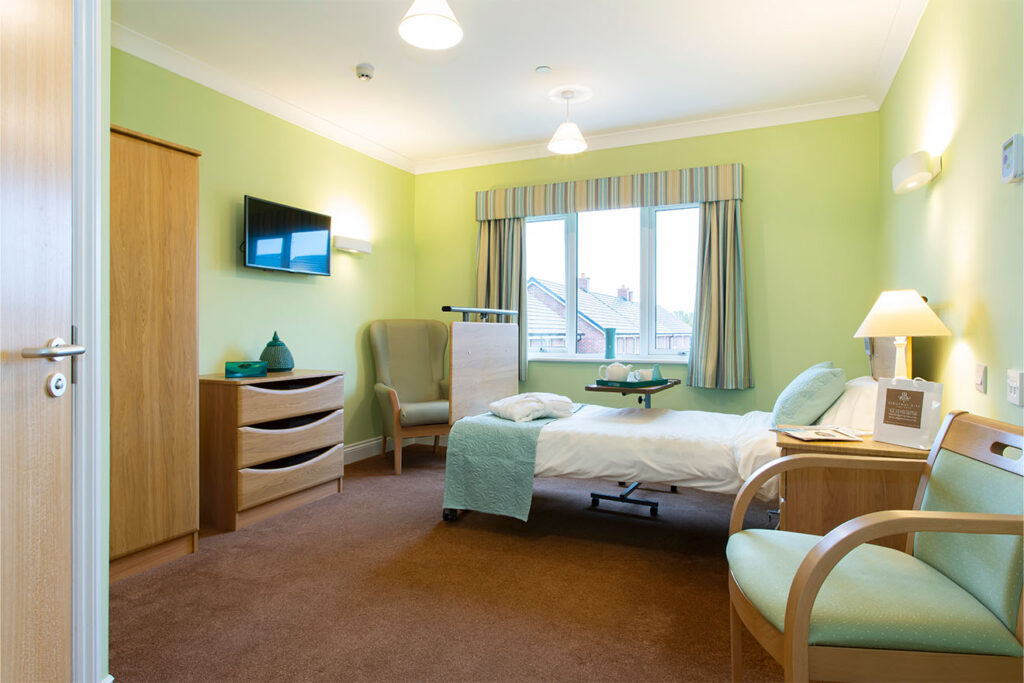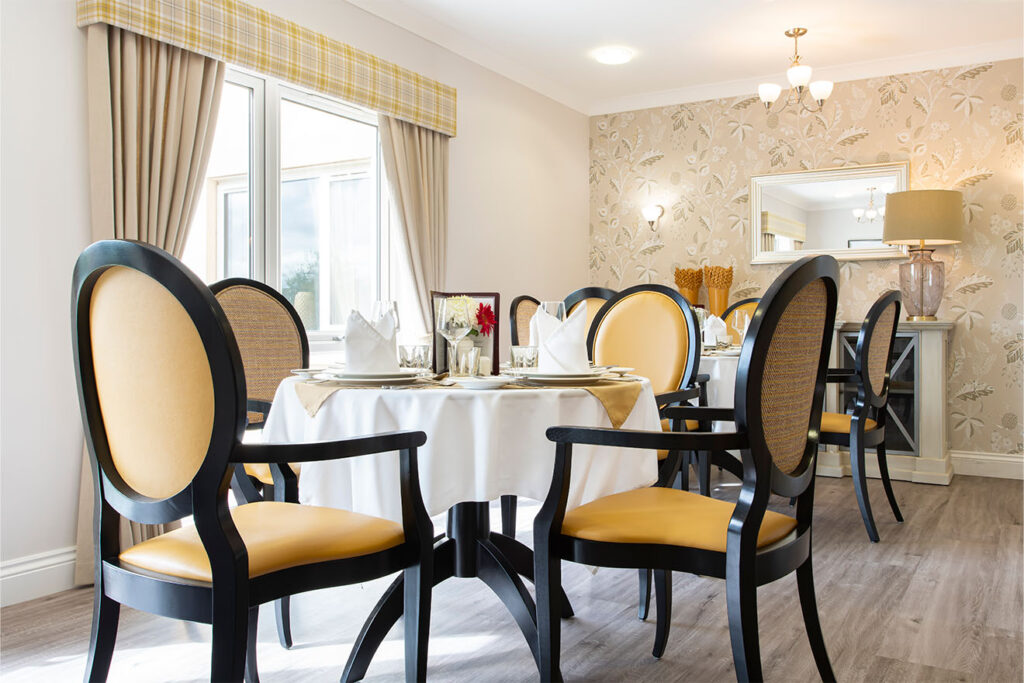What is the Difference Between Care Homes and Home Care?

As individuals progress through the various stages of life, it is inevitable to encounter the challenges that come with ageing, facing health issues that limit their capacity for independent living such as physical declines in health or mental. The importance of care and support becomes increasingly evident when these issues arise. When families and individuals are in need of additional care and assistance, two primary options often emerge as the focal points of consideration: care homes and home care. Both services are significantly different in terms of their setting, services provided and the overall experience they offer to those in need.
Within this blog, we look into the characteristics, advantages and limitations of care homes and home care. By gaining a better understanding of these two fundamental forms of caregiving, individuals and their families can make informed decisions that support the preferences and needs of their situations. Whether you find yourself in the position of seeking care for a cherished family member or personally contemplating the best course of action, this comparative analysis will serve as a guiding light, helping you make a well-informed decision about whether moving into a nursing home or having care carried out at home is the best option.
What is Home Care in the UK?
Home care in the UK is the delivery of personalised care, support and companionship to individuals within the comforts of their own homes, allowing them to maintain their independence and dignity. In the UK, home care services are typically administered by trained professionals, including carers and registered nurses, who customise their assistance to suit each individual's specific needs and preferences. These services encompass a wide array of tasks, such as aiding with personal care, managing medications, preparing meals and providing mental support. The primary goal is to improve the overall quality of life for the elderly and individuals with disabilities, enabling them to continue residing in their familiar surroundings while receiving the necessary care to meet their distinct medical requirements.
Home care offers numerous benefits, making it an attractive option for individuals in need of care and support. Some of the key advantages of home care include:
- Familiar Environment: Home care allows an individual to receive assistance and medical attention in the comfort of their own home. Being in a familiar environment can reduce stress and anxiety, promoting a sense of security and well-being.
- Independence: Home care encourages independence. It enables individuals to maintain control over their daily routines, choices and lifestyles, fostering a sense of autonomy and self-esteem.
- Personalised Care: Home care services are tailored to the specific needs and preferences of each individual. Care plans are designed to address unique requirements, ensuring a more personalised and effective approach to care.
- Family Involvement: Home care encourages family involvement and allows loved ones to actively participate in the care process. This can strengthen family bonds and provide emotional support.
- Cost-Effective: In many cases, home care can be more cost-effective than care home facilities. It often involves fewer overhead costs, and it allows individuals to remain in their own homes, eliminating the need for facility fees.
- Reduced Risk of Infections: Home care can reduce the risk of exposure to contagious illnesses that may be more prevalent in settings such as nursing homes or hospitals.
- Comfort and Privacy: Home care provides a level of comfort and privacy that is difficult to replicate in communal living situations. Individuals can maintain their dignity and privacy in their own homes.
- Flexibility: Home care can be tailored to different schedules and needs, ranging from a few hours a day to 24/7 care. This flexibility allows for adjustments as the individual's requirements change over time.
- Emotional Well-Being: Remaining at home can contribute to better emotional and mental well-being. Familiar surroundings, personal belongings, and the absence of institutional settings can enhance an individual's overall quality of life.
What is Care Services like in a Care Home?
In the United Kingdom, care services in a care home play a vital role in providing comprehensive support and assistance to individuals who require full-time care and accommodation due to age-related needs or health challenges. Care homes, often regulated and inspected by government authorities, offer a range of services tailored to residents' specific requirements. These services typically include assistance with daily activities like bathing, dressing and medication management, as well as access to medical care and recreational programs that enhance residents' physical and emotional well-being. Care homes in the UK are staffed with trained professionals, including caregivers, nurses and support staff, who work to create a safe and nurturing environment, ensuring that residents receive the highest standard of care, comfort and dignity while residing in a communal setting.
Care in a care home can offer several advantages over home care, depending on an individual's specific needs and circumstances. Here are some reasons why care in a care home can be more beneficial:
- Round-the-Clock Care: Care homes provide 24/7 care and supervision. This constant availability ensures that individuals with complex medical needs or those who require frequent assistance have continuous support, which may not always be feasible with home care.
- Specialised Facilities: Care homes often have specialised equipment, facilities and resources that cater to specific medical conditions or care requirements. This can be particularly beneficial for individuals with complex health needs.
- Social Interaction: Living in a communal setting allows residents to engage with peers, reducing isolation and promoting social interaction. This can have a positive impact on mental and emotional well-being, especially for those who may be at risk of loneliness at home.
- Structured Activities: Care homes typically offer a variety of structured activities and programs to keep residents engaged and active. These activities can help maintain cognitive function and improve overall quality of life.
- Trained Staff: Care homes are staffed by a team of professionals, including nurses, caregivers and therapists, who are trained to provide specialised care. This expertise can be especially valuable for individuals with complex medical conditions.
- Respite for Family: For families providing care, placing a loved one in a home can offer respite and relief from the demands of caregiving. It allows family members to focus on their relationship without the constant pressure of caregiving responsibilities.
- Safety and Security: Care homes are designed to prioritise safety and security. They are equipped with safety features including monitored personal alarms, emergency response systems and staff trained to handle emergencies, reducing the risk of accidents.
- Professional Oversight: Care homes are subject to regulation and inspection by relevant authorities. This oversight ensures that they adhere to specific standards of care and safety, providing an additional layer of protection for residents.
- Medication Management: Care homes have systems in place for medication management, ensuring that residents receive their prescribed medications on time and in the correct dosage, reducing the risk of medication-related issues.
- Consistency of Care: Care homes provide a consistent care environment, with a dedicated staff on hand, minimising the variability that can occur with different home care providers which can cause confusion in care if things are not carefully monitored.
It's important to note that the choice between care in a home and home care depends on an individual's unique needs, preferences, and circumstances. Some individuals may thrive in the comfort and familiarity of their own homes, while others may benefit from the comprehensive care, specialised resources, and social support that a care home can offer. The decision should be based on a thorough assessment of the individual's needs and a consideration of the available options.

Care Services Provided in Care Homes
Care in a care home encompasses a diverse range of specialised services, each tailored to meet the unique needs of residents. Residential care, often the starting point for those needing assistance, provides support with daily activities, ensuring a safe and comfortable environment. Nursing care, on the other hand, is geared towards individuals with complex medical needs, offering round-the-clock medical support and supervision. Dementia care is designed to address the specific challenges faced by individuals with cognitive impairments, employing specialised approaches and trained staff. Respite care serves as a temporary relief for primary caregivers, allowing them time to rest while their loved ones receive professional care. Finally, palliative care focuses on individuals with life-limiting illnesses, aiming to enhance their quality of life through symptom management, emotional support and end-of-life care, all within the compassionate and comforting setting of a care home. These various forms of care within a care home ensure that individuals receive the specialised support they require, enhancing their well-being and quality of life.
Residential Care Services
Residential care within a care home refers to the level of support and assistance provided to individuals who are no longer able to live independently but do not require extensive medical care. In a residential care setting, residents receive help with their daily activities, such as personal care, dressing, meal preparation and medication management. The primary focus is on creating a safe and comfortable living environment where residents can maintain their independence while receiving the necessary support. Carers play a vital role in ensuring the well-being of residents, fostering a sense of community and providing companionship. Residential care is an ideal choice for those who need assistance with daily tasks but do not have severe medical needs, allowing them to enjoy a quality life in a secure and sociable setting.
Nursing Care And Support in a Care Home
Nursing care in a care home is a specialised level of support designed for individuals with complex medical needs. In a nursing care setting, residents receive round-the-clock medical attention and supervision from trained nursing staff. This level of care includes services such as administering medications, wound care, monitoring vital signs and managing chronic conditions. Nursing care facilities are equipped to handle a wide range of medical requirements, providing a high level of medical expertise and specialised equipment. The focus is on ensuring that residents receive the comprehensive medical care they need while still benefiting from a comfortable and supportive living environment. Nursing care in a care home is a vital resource for individuals who require ongoing medical management and supervision, offering peace of mind to both residents and their families.
Dementia Care Services in a Care Home
Dementia care in a care home is a specialized form of support tailored to individuals living with cognitive impairments, such as Alzheimer's disease and other forms of dementia. In a dementia care setting, staff members are trained to provide compassionate, person-centred care that focuses on managing the unique challenges associated with memory loss and cognitive decline. Care homes offering dementia care employ strategies to enhance residents' quality of life, including memory-stimulating activities, safe and secure environments and routines that provide structure and comfort. The aim is to minimise distress, confusion and agitation while promoting dignity and well-being. Dementia care in a care home is essential for those who require a safe and supportive environment specifically designed to cater to the complex needs of individuals living with dementia, offering families peace of mind knowing their loved ones are in capable and understanding hands.
Respite Care Supporting Families
Respite care in a care home offers a temporary break to primary caregivers, allowing them to recharge while their loved ones receive professional care within a care facility. This short-term care service can be especially valuable for families caring for elderly relatives or individuals with health challenges at home. During respite care stays, residents benefit from the same level of support and services as long-term residents, including assistance with daily activities, companionship and a safe living environment. Respite care provides caregivers with much-needed relief, reducing stress and burnout and allowing them to attend to their own well-being or take care of other responsibilities while ensuring their loved ones continue to receive excellent care in their absence. It serves as a crucial resource to maintain the health and balance of both caregivers and care recipients.
Palliative Care in a Nursing Home
Palliative care in a care home is a specialised and compassionate approach that focuses on enhancing the quality of life for individuals with life-limiting illnesses, especially in the later stages of their conditions. This form of care aims to provide comfort, relieve pain, manage symptoms and offer emotional and psychological support to residents and their families. Palliative care in a care home strives to ensure that residents experience dignity and minimal suffering in their final stages of life. It includes end-of-life planning, pain management and addressing emotional and spiritual needs. By offering comprehensive, person-centred care within a care home setting, palliative care helps individuals find comfort and solace in their surroundings, surrounded by a supportive and empathetic care team.



Our Residential Home in Swindon
Our exquisite, all-inclusive luxury residence has been thoughtfully designed to encompass a remarkable array of features, conveniences, and services that all our residents can relish. At Ridgeway Rise Care Home in Wiltshire, there's something to captivate everyone's interest, whether it's our movie sessions featuring timeless classics and recent releases, the delight of afternoon tea in our beautifully landscaped gardens or the pampering and rejuvenation that can be found in our hair and beauty salon.
We are dedicated to providing an extensive assortment of amenities and possibilities that empower our residents to embrace life to the fullest. From serene afternoons spent engrossed in a good book to engaging in gardening activities, our offerings have been thoughtfully curated to provide residents with a life filled with diversity and personal choice.
Featuring 73 generously proportioned and tastefully adorned rooms with expansive vistas of Swindon, Ridgeway Rise Care Home affords residents the opportunity to lead a fulfilling and self-reliant life. Our guiding principle is to create an environment where comfort and contentment reign supreme, achieved through the fusion of top-tier care and an array of enriching activities that cater to individual preferences, all crafted to promote well-being and a structured daily routine.
We take great pride in offering 24/7 care in various forms, including Residential Care, Nursing Care, Dementia Care, Respite Care and Palliative Care. Nestled in the picturesque county of Wiltshire, our purpose-built, luxurious care home embodies a true 'home away from home.' Here, a team of certified nursing and care professionals is always available to provide the highest calibre of comprehensive care, tending to residents' holistic well-being.





